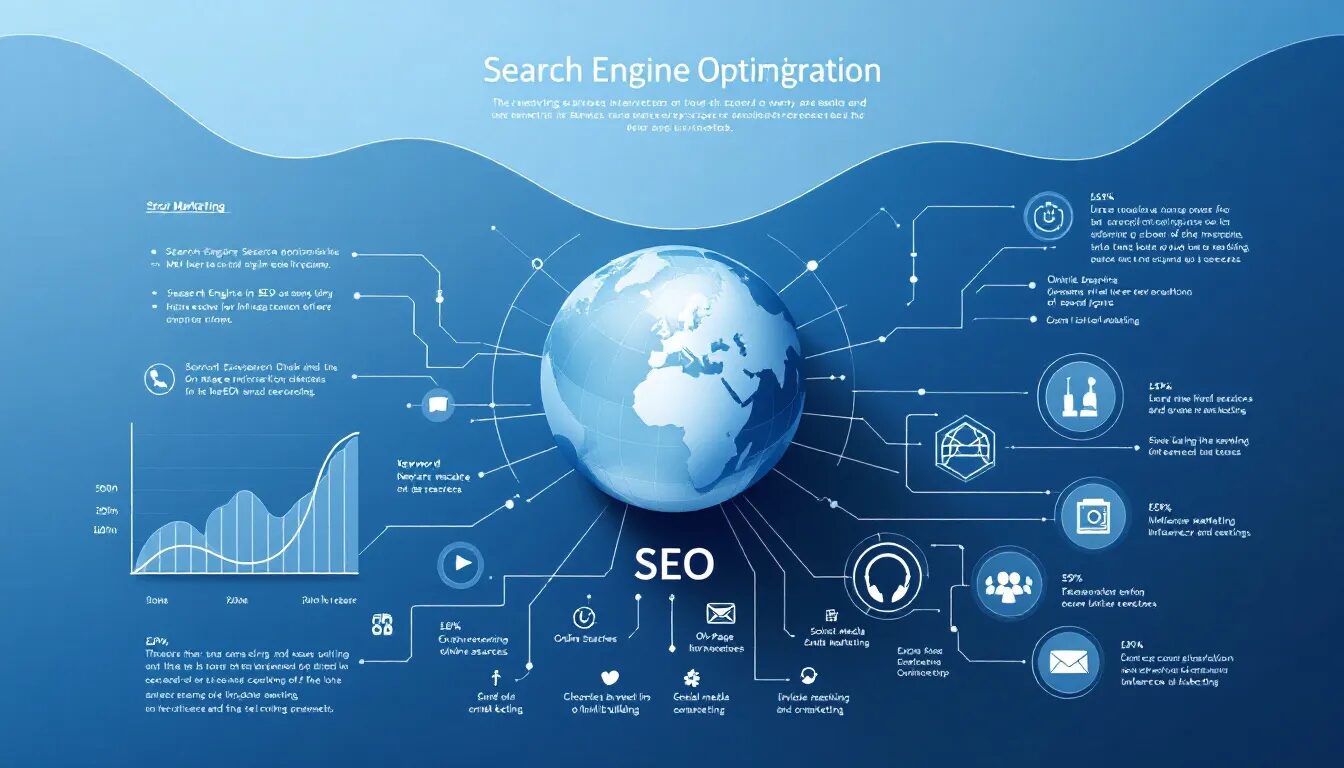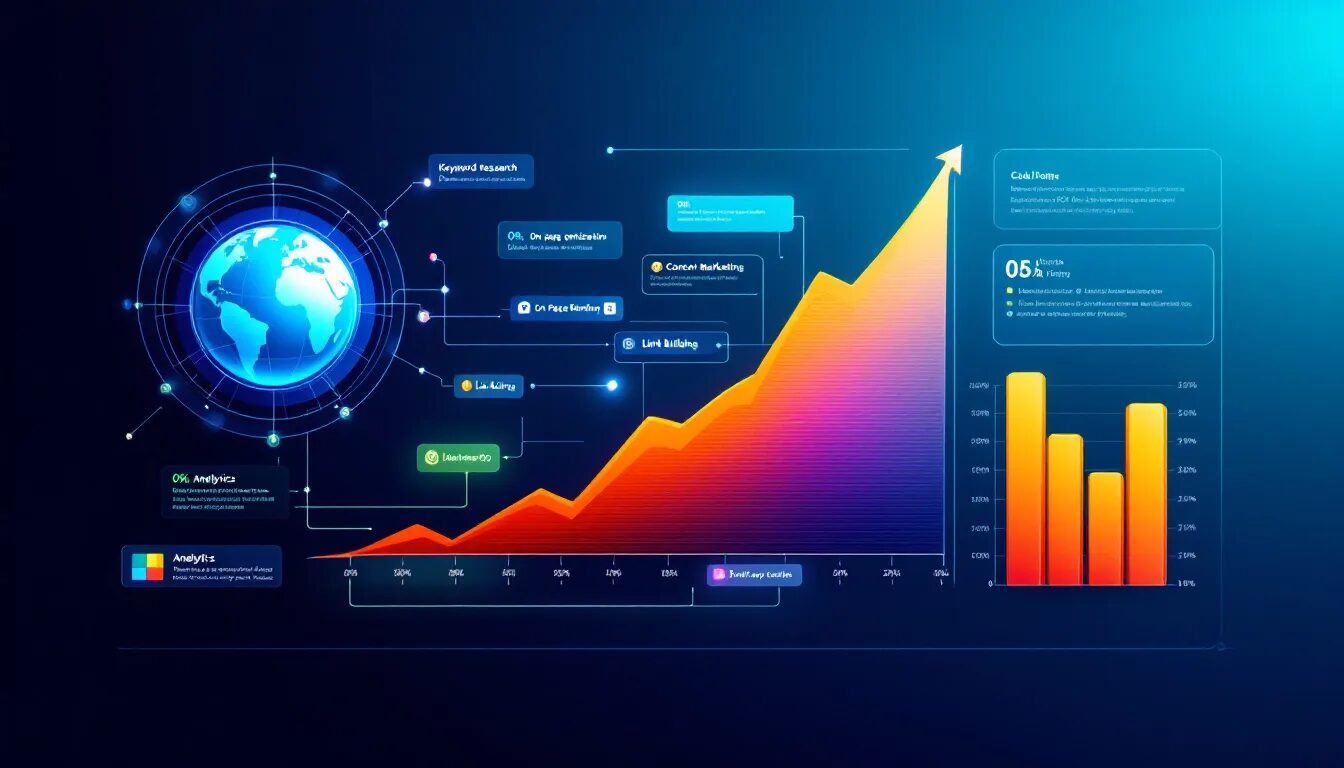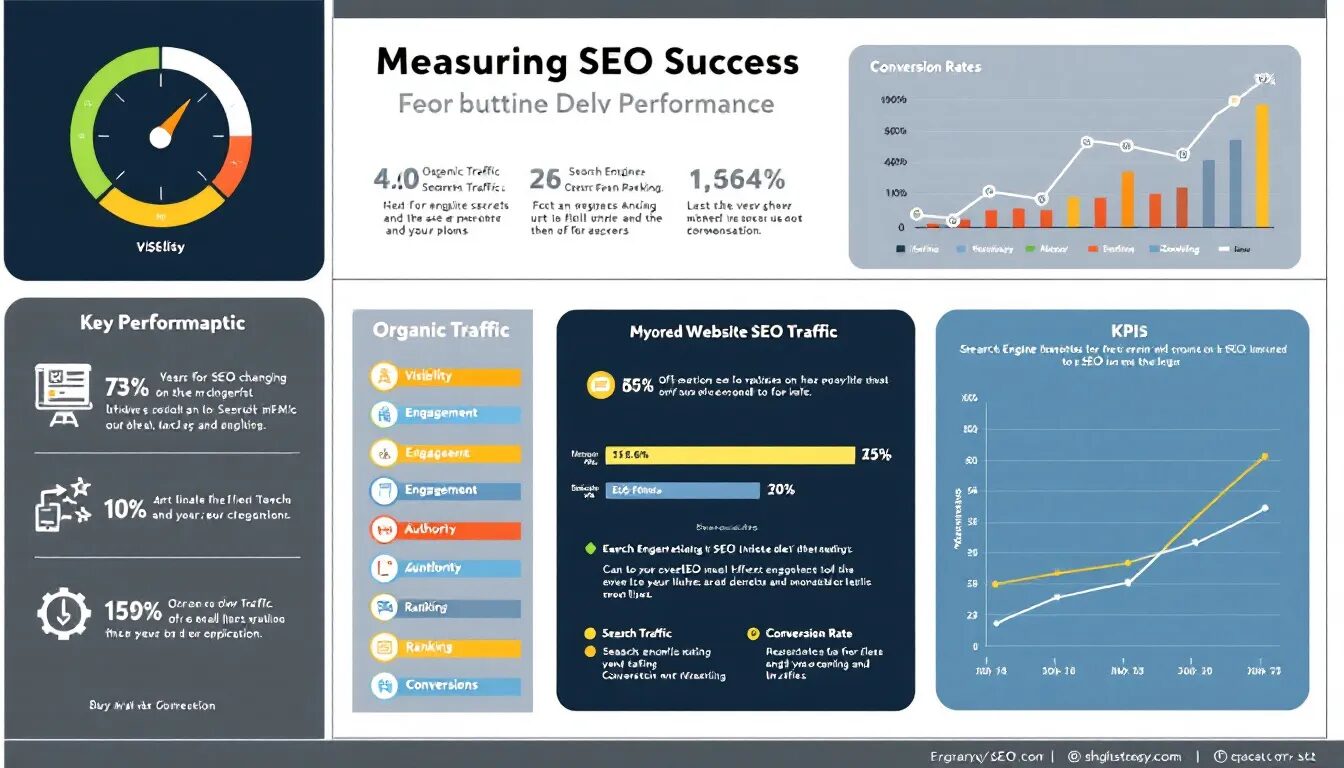SEO mkt is about optimizing your website to improve its visibility on search engines like Google, and attract organic traffic. This guide will cover essential strategies and tips for mastering SEO marketing in 2025, including effective on-page, off-page, and technical SEO practices.
Key Takeaways
SEO marketing enhances online visibility and drives qualified traffic through the optimization of on-page, off-page, and technical components.
The integration of AI tools in SEO practices allows for more efficient keyword research, content optimization, and user behavior analysis.
Regular SEO audits and performance tracking using analytics tools are essential for maintaining and improving search engine rankings and overall strategy effectiveness.
Understanding SEO Marketing

Search Engine Optimization, or SEO, stands as a cornerstone of digital marketing, aiming to enhance visibility on search engines like Google. The primary goal of SEO is to optimize various elements of your website to achieve greater organic visibility, driving more qualified traffic to your site. Unlike paid search, search engine optimization seo focuses on earning traffic naturally, making it a cost-effective and sustainable strategy. Additionally, search engine marketing complements these efforts by promoting visibility through paid channels.
The integration of SEO with other digital marketing channels, such as paid search and social media, can significantly amplify your overall marketing efforts. This holistic approach ensures that all aspects of your online presence are working in harmony, creating a more robust and effective digital marketing strategy.
Over the years, SEO has evolved from simple keyword stuffing and clickbait tactics to a more sophisticated practice that emphasizes high-quality content and user engagement. Today, mastering SEO requires a deep understanding of keyword research, content optimization, and the technical aspects of website management. SEO is a continuous process that must adapt to ever-changing search engine algorithms, user behavior trends, and competitor strategies.
Search engines like Google search use complex algorithms to find, index, and rank web pages through processes known as crawling, indexing, and ranking. Understanding how these search engines work is fundamental to implementing effective SEO strategies that improve your site’s visibility and performance.
Key Components of SEO Marketing
SEO marketing is built on three core components: on-page SEO, off-page SEO, and technical SEO. The effectiveness of your SEO marketing process hinges on the integration of these components, ensuring that your website is optimized in every possible way.
Each component plays a vital role in your SEO strategy, and mastering them is key to achieving higher search engine rankings and driving organic traffic.
On-Page SEO Techniques
On-page SEO involves optimizing various elements of your web pages to improve user experience and search visibility. This includes optimizing metatags, images, and URLs to ensure they are relevant and descriptive. Descriptive URLs, for instance, not only enhance user navigation but also help search engines understand the content of your pages better.
Content relevance and user experience are fundamental to on-page optimization. Ensuring your content is valuable, engaging, and aligned with user intent can significantly boost your search rankings. Techniques like using high-quality images and well-structured text can help search engines understand your content better and provide a more enjoyable experience for your visitors.
Artificial intelligence (AI) is playing an increasingly important role in on-page SEO. AI tools can suggest relevant keywords and improve content structure for better readability, making it easier to create SEO-friendly content that resonates with your audience.
Off-Page SEO Strategies
Off-page SEO focuses on building your website’s authority through external signals like backlinks and social media shares. Backlinks, or links from other websites to yours, are a critical factor in search engine rankings. However, the quality of these backlinks is more important than the quantity. Links from authoritative and relevant websites can significantly improve your SEO rankings.
Link building is an effective method to improve your site’s authority and visibility. This can be achieved by acquiring backlinks from reputable sources and engaging in social media marketing to increase your content’s reach and attract more backlinks. Social media platforms can enhance your link-building efforts by driving traffic to your site and increasing your online presence.
Off-page SEO should focus on acquiring high-quality backlinks rather than just aiming for a large number of links. This approach ensures that your site gains credibility and ranks higher in search engine results pages (SERPs).
Technical SEO Best Practices
Technical SEO ensures that your website is optimized for search engine crawlers and users. A well-organized website structure aids search engines in understanding the relationship between pages, improving crawlability and indexing. Key elements of technical SEO include URL structure, navigation, internal linking, and usability, all of which support a well-structured website architecture.
A site map is a critical tool in technical SEO, providing search engines with information about your site’s pages for better crawling. Additionally, ensuring your website is mobile-friendly and has fast load times can significantly enhance crawlability and user experience.
Importance of SEO Marketing

SEO marketing is essential for businesses looking to increase their online visibility and attract organic traffic. An SEO-friendly website not only draws in more visitors but also enhances user experience, leading to higher engagement and satisfaction.
Effective SEO can significantly boost search engine rankings, making it easier for potential customers to find your business and improving brand awareness.
Boosting Organic Traffic
Investing in SEO can lead to a consistent flow of visitors to your website, as it improves visibility and attracts organic traffic without the need for ongoing paid advertising. High search engine rankings are crucial since a significant portion of users do not click beyond the first page of search results.
Enhancing User Experience
Publishing high-quality, helpful content is essential for optimizing user experience. Search engines look for relevant content that satisfies searcher intent, is well-structured, and offers authoritative information. Using subheadings, bullet points, and numbered lists can improve the navigation of content on a page, making it easier for users to find the information they need.
Enhancing user experience also involves using images, graphics, and videos to make the reading experience more engaging. Well-designed content is more likely to attract and retain readers, thereby improving engagement and satisfaction.
Increasing Online Visibility
High search engine rankings significantly improve online visibility, leading to increased brand awareness and web traffic. Top organic search results can receive ten times more clicks than lower-ranked pages, emphasizing the importance of SEO in driving web traffic.
Implementing advanced tactics such as schema markup can enhance visibility in search results, making your content stand out. Optimizing local citations helps businesses appear in local search results, enhancing their visibility to nearby customers.
Developing an Effective SEO Marketing Strategy

An effective SEO strategy serves as a long-term action plan to achieve specific business goals. Building an SEO strategy involves:
Analyzing competitors
Understanding the target audience
Creating SEO-friendly content
Improving technical SEO
Acquiring authoritative backlinks
Continuous adjustment based on performance data and algorithm updates is essential for maintaining and improving your SEO efforts.
Conduct Keyword Research
Setting clear SEO objectives is vital for aligning keyword research with overall business goals. Identifying terms that your site can realistically rank for, including less competitive long-tail keywords, is crucial for effective keyword research. This approach helps in understanding customer behavior and search intents, revealing the terms they are searching for and the related questions they ask.
Competitive analysis techniques can further refine your keyword strategies. Using advanced tools can automate the keyword research process, providing insights into competitors’ SEO performance and helping you formulate effective strategies.
Competitor Analysis
Creating a list of competitors for SEO analysis should include both familiar competitors and those ranking high for related keywords. Identifying organic competitors can provide valuable insights into shared keywords and traffic sources, informing your SEO strategy.
Analyzing competitors’ SEO efforts allows you to identify strengths and weaknesses in your own strategy. This information can help refine your SEO efforts to improve rankings and drive more organic traffic.
Creating High-Quality Content
Creating unique, relevant, and easily readable content is crucial for improving search rankings. Good SEO practices enhance website usability, contributing to a more positive experience for visitors. Voice search queries typically use more conversational language, leading to longer keyword phrases, so optimizing for voice search involves providing concise answers, ideally around 30 words.
AI content generation tools assist in creating engaging and SEO-friendly content by analyzing trending topics and audience preferences. Improving page load speed is essential, as consumers expect websites to load within three seconds to minimize bounce rates.
Regular assessments enable the identification of outdated content, ensuring it remains relevant to users and search engines.
Advanced SEO Marketing Tactics

Advanced SEO tactics are essential for improving search engine performance and staying competitive. Leveraging a diverse set of SEO tools, from ranking and reporting tools to AI-driven SEO tools, can significantly enhance a website’s performance by providing actionable insights and optimizing digital strategies.
Local SEO Optimization
Local SEO is designed to enhance visibility for businesses during searches that indicate local intent, such as those including ‘near me’ or specific locations.
Effective local SEO strategies include:
Optimizing your Google Business Profile
Ensuring consistent NAP citations across various platforms
Utilizing local keywords within your website content and metadata.
Ranking in Google’s local map pack requires a combination of relevance to the search, proximity to the searcher, and prominence of the business. Embedding a Google Map on your website can help signal to Google that your business has a physical presence in a specific location.
Voice Search Optimization
The rise of voice search indicates a transformation in how users interact with technology, emphasizing the need for marketing strategies to adapt. Over 50% of online searches are now done using voice commands, reflecting this significant shift in search behavior.
Optimizing content for natural language processing and voice query formats will be essential for businesses. Emerging AI trends predict significant advancements in voice search optimization and personalized content delivery, making it crucial to stay ahead of the curve.
Leveraging Google Analytics
Google Analytics is crucial for tracking SEO performance, allowing businesses to understand how visitors interact with their sites and optimize their strategies accordingly. Key features to utilize include real-time reporting, audience demographics, acquisition channels, and user flow visualization, which empower effective SEO management.
By regularly analyzing Google Analytics data, businesses can refine their SEO strategies and improve overall online visibility through targeted optimizations. Interpreting the data helps identify successful keywords, pages with the highest traffic, and bottlenecks where users drop off, indicating areas for SEO improvement.
The Role of AI in SEO Marketing
Artificial intelligence is transforming SEO marketing by providing advanced methods for optimization. AI enhances keyword research and automates content generation, streamlining the SEO process and making it more efficient.
AI tools analyze user behavior and preferences to provide deeper insights into user intent, allowing for more targeted and effective SEO strategies. Integrating AI into your SEO efforts improves efficiency and helps in reaching your target audience more effectively.
Measuring SEO Success

Effective SEO measurement involves tracking various key performance indicators (KPIs) that can indicate success. This includes metrics like organic traffic, bounce rate, and conversion rates, which provide insights into the effectiveness of SEO efforts.
Tracking SEO Performance
Important metrics for measuring SEO performance include organic traffic, bounce rate, and conversion rates, which provide insights into the effectiveness of SEO efforts. Evaluating the effectiveness of SEO strategies can be enhanced through the use of analytics tools such as Google Analytics, enabling marketers to track user behavior and strategy effectiveness.
Setting up goals in Google Analytics helps marketers measure conversions and performance, providing a clearer measure of SEO effectiveness. Regular monthly reports provide an overview of site performance, KPI trends, and assist in decision-making processes to improve ongoing SEO efforts.
Regular SEO Audits
A comprehensive website audit should include competitive benchmarking, a site audit, site analytics review, and link risk assessment. Monitoring is crucial during SEO audits as it helps identify issues such as traffic drops, slow pages, and broken links.
Regular SEO audits are essential for maintaining high search engine rankings and addressing potential issues before they impact site performance. Incorporating regular audits into your strategy enhances your ability to optimize and respond to changes in the digital landscape.
Choosing the Right SEO Company
Investing in tailored SEO services is essential to meet specific business needs and maintain a robust online presence. Reviewing a company’s portfolio and client testimonials can provide important insights into their past successes and capabilities, ensuring they are the right fit for your business.
Evaluating SEO Services
During the discovery phase, SEO companies meet with stakeholders, conduct site reviews, identify KPIs, determine conversion paths, and perform keyword research. A reputable SEO company offers monthly video summaries reviewing SEO improvements and strategy, alongside custom in-depth reporting, including Google Analytics reports.
Transparency is key; the company should maintain full clarity about their methods without smoke and mirrors. Ensuring the SEO firm practices white hat SEO and adheres to principles of honesty and accountability to avoid ethical issues is crucial.
A strong reputation is signified by numerous positive reviews, and certifications such as being a Google Premier Partner enhance credibility.
Questions to Ask Potential SEO Companies
Inquire about the number of years the SEO company has been in business and their experience with your industry. Asking for examples of successful projects or case studies can demonstrate their expertise in achieving desired results.
Discuss the specific SEO strategies they plan to implement and the expected timeline for seeing results. Inquire about their approach to keyword research and how they select keywords relevant to your business.
Ask about the range of SEO services they provide, from on-page optimization to content creation and link building. Request information on how they will report performance metrics and the frequency of these updates.
Summary
In summary, mastering SEO marketing in 2025 involves understanding the core components of SEO, developing an effective strategy, and implementing advanced tactics. The integration of on-page, off-page, and technical SEO ensures a comprehensive approach to improving search engine rankings and driving organic traffic. By focusing on high-quality content, user experience, and leveraging tools like Google Analytics and AI, businesses can stay ahead in the competitive digital landscape.
As we conclude, remember that SEO is a continuous process that requires ongoing efforts and adaptation to changing algorithms and user behaviors. By investing in tailored SEO services and regularly measuring and auditing your SEO efforts, you can achieve sustained success and growth for your business. Embrace the power of SEO and watch your online presence soar.
Frequently Asked Questions
What is the primary goal of SEO?
The primary goal of SEO is to optimize a website to enhance its organic visibility, thereby increasing qualified traffic without reliance on paid advertising. Achieving this can lead to sustained growth and improved online presence.
How does on-page SEO differ from off-page SEO?
On-page SEO focuses on optimizing elements directly within your website, such as metatags and images, to enhance user experience and search visibility. Conversely, off-page SEO aims to establish your website’s authority through external factors like backlinks and social media engagement.
Why is keyword research important in SEO?
Keyword research is crucial in SEO as it reveals customer behavior and search intent, allowing you to target relevant terms and discover achievable long-tail keywords. This strategic approach enhances your site’s potential to rank effectively in search results.
What role does AI play in SEO marketing?
AI plays a crucial role in SEO marketing by automating tasks like keyword research and content generation, while also analyzing user behavior to enhance strategies. This leads to improved insights into user intent and overall optimization efficiency.
How can I measure the success of my SEO efforts?
To effectively measure the success of your SEO efforts, focus on key performance indicators (KPIs) such as organic traffic, bounce rate, and conversion rates. Utilizing tools like Google Analytics will provide valuable insights into user behavior and the overall effectiveness of your SEO strategy.





